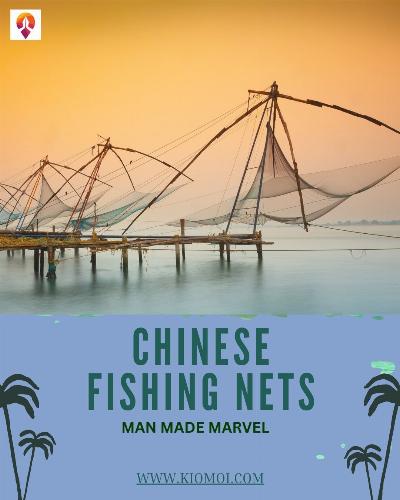The Rich History of Chinese Fishing Nets in Kochi: A Journey Through Time

Strong 8k brings an ultra-HD IPTV experience to your living room and your pocket.
The Chinese Fishing Nets, or "Cheenavala," are among the most iconic symbols of Kochi, a historic port city in Kerala, India. These remarkable fishing structures not only serve as a picturesque attraction but also embody a fascinating historical narrative that intertwines cultures and epochs. Their story spans from ancient China to the bustling shores of Kochi, offering a unique glimpse into the maritime history of the region. This article explores the rich History of Chinese Fishing Nets Kochi , highlighting their origins, evolution, and cultural significance.
Origins and Introduction
The origins of the Chinese Fishing Nets trace back to the 14th century, a period marked by significant maritime trade between Asia and Europe. The nets were introduced to Kochi by Chinese traders, specifically the Ming Dynasty's explorers and merchants who frequented the Indian Ocean trade routes. These traders brought with them not only goods but also technological innovations that would leave a lasting impact on the regions they visited.
The fishing nets are believed to have been inspired by similar devices used in China, where the cantilevered design was employed for efficient fishing in various coastal regions. The introduction of these nets to Kochi marked a pivotal moment in the city’s history, as it integrated a sophisticated Chinese technique into the local fishing practices.
Design and Mechanism
The Chinese Fishing Nets are notable for their intricate design, which combines both functionality and artistry. They consist of a large, horizontal net suspended from a wooden frame, which is propped up by a system of ropes and counterweights. The frame is anchored to the shore and extends out into the water, where the net is lowered and raised in a sweeping motion.
The mechanism involves a series of pulleys and weights that allow the fishermen to operate the nets with precision. The process requires teamwork and coordination, as the fishermen use a series of ropes to lift the heavy net out of the water, often with a dramatic, theatrical flair. The design is not only effective for catching fish but also creates a visually stunning spectacle that has become a hallmark of Kochi’s waterfront.
Cultural and Economic Impact
The introduction of Chinese Fishing Nets had a profound impact on Kochi’s local economy and culture. Prior to their arrival, traditional fishing methods in the region were relatively simple, often relying on basic nets and boats. The sophisticated design of the Chinese Fishing Nets revolutionized local fishing practices, enhancing efficiency and productivity.
Economically, the nets contributed to the growth of Kochi as a major trading hub. The increased catch facilitated trade with various regions, boosting the city’s status as a prominent port in the Indian Ocean trade network. The nets became integral to the livelihoods of local fishermen, who adapted the Chinese technology to suit their needs and integrate it into their daily routines.
Culturally, the nets symbolize the rich history of maritime trade and cross-cultural interactions in Kochi. They represent a fusion of Chinese and Indian traditions, illustrating how technological exchanges between civilizations can lead to lasting and meaningful impacts. The continued use of the nets in modern times serves as a living testament to this historical exchange.
Preservation and Tourism
In contemporary Kochi, the Chinese Fishing Nets have evolved into a significant tourist attraction. Their historical and cultural value has made them a must-see feature for visitors exploring the city. The nets not only offer a glimpse into traditional fishing practices but also provide an opportunity to experience the rich maritime heritage of Kochi.
To preserve this cultural landmark, local authorities and community organizations have implemented various initiatives. These include maintenance programs to ensure the nets remain in good working condition and efforts to promote the historical significance of the nets to tourists. The revenue generated from tourism helps support the local fishing community, contributing to both the preservation of the nets and the well-being of the fishermen.
Challenges and Future Outlook
Despite their historical and cultural significance, the Chinese Fishing Nets face several challenges in the modern era. Environmental changes, such as pollution and climate change, have impacted the marine ecosystem, affecting the fishing practices associated with the nets. Additionally, the growth of tourism presents both opportunities and challenges, as managing visitor numbers and maintaining the authenticity of the experience are crucial for sustaining the cultural heritage.
Efforts to address these challenges include increasing awareness about the importance of environmental conservation and implementing sustainable tourism practices. By balancing the needs of tourism with environmental and cultural preservation, Kochi can continue to honor the legacy of the Chinese Fishing Nets while ensuring their continued relevance and impact.
Conclusion
The history of the Chinese Fishing Nets in Kochi is a compelling narrative of cultural exchange, technological innovation, and economic development. From their origins in 14th-century China to their integration into the local fishing practices of Kochi, these nets embody a rich historical tapestry that highlights the interconnectedness of global civilizations.
As both a functional tool and a symbol of heritage, the Chinese Fishing Nets continue to captivate visitors and locals alike. Their enduring presence in Kochi serves as a reminder of the city’s historical significance as a maritime crossroads and the dynamic cultural interactions that have shaped its development. By understanding and appreciating the history of these nets, we honor the legacy of the past and ensure that this unique aspect of Kochi’s heritage remains vibrant for future generations.
Note: IndiBlogHub features both user-submitted and editorial content. We do not verify third-party contributions. Read our Disclaimer and Privacy Policyfor details.


